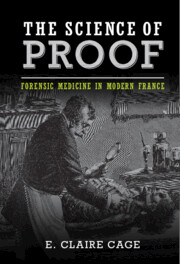Book contents
- The Science of Proof
- Studies in Legal History
- The Science of Proof
- Copyright page
- Contents
- Figures
- Acknowledgments
- Introduction
- 1 The Science of Death
- 2 Poisoning and the Problem of Proof
- 3 Deception and Detection
- 4 Reproductive Bodies and Crimes
- 5 The Forensics of Sexual Crimes against Children
- Conclusion and Epilogue
- Notes
- Bibliography
- Index
3 - Deception and Detection
Published online by Cambridge University Press: 25 August 2022
- The Science of Proof
- Studies in Legal History
- The Science of Proof
- Copyright page
- Contents
- Figures
- Acknowledgments
- Introduction
- 1 The Science of Death
- 2 Poisoning and the Problem of Proof
- 3 Deception and Detection
- 4 Reproductive Bodies and Crimes
- 5 The Forensics of Sexual Crimes against Children
- Conclusion and Epilogue
- Notes
- Bibliography
- Index
Summary
Malingering, the practice of feigning medical conditions for specific purposes, became a pressing concern for many practitioners of legal medicine following the introduction of conscription during the Revolutionary and Napoleonic Wars. A burgeoning medicolegal literature on malingering revealed that some doctors went to great lengths to detect and expose malingerers by using deceit, coercion, painful procedures, and altered states of consciousness as diagnostic tools. Doctors justified the far-reaching tactics used in adversarial contests with suspected malingerers in the name of the public good. Acting on behalf of the state to expose them, doctors engaged in adversarial relationships with suspected malingerers. These encounters also provided an impetus for debates about medical ethics; however, ethical concerns about doctors’ methods of detecting malingering were rarely raised and debated until the end of the nineteenth century.
- Type
- Chapter
- Information
- The Science of ProofForensic Medicine in Modern France, pp. 79 - 109Publisher: Cambridge University PressPrint publication year: 2022

